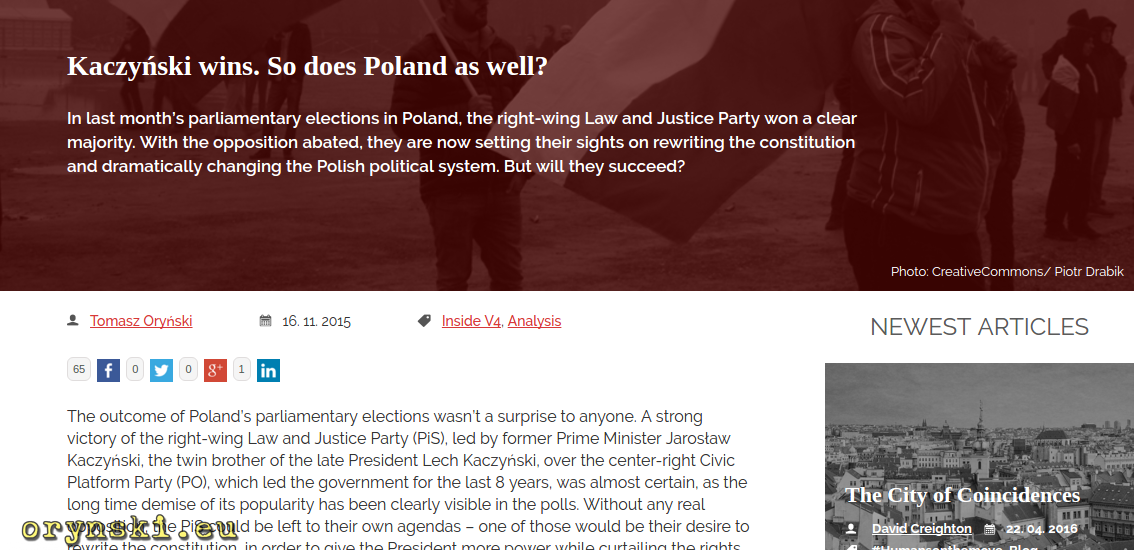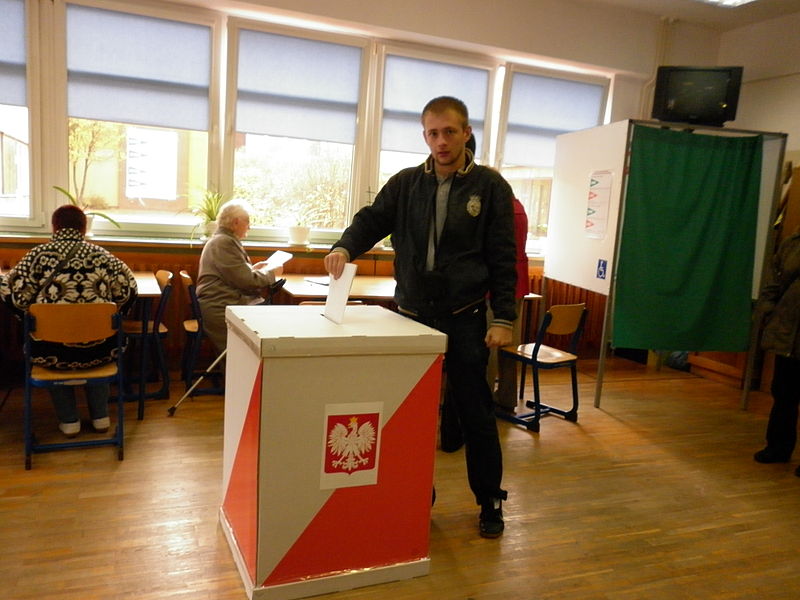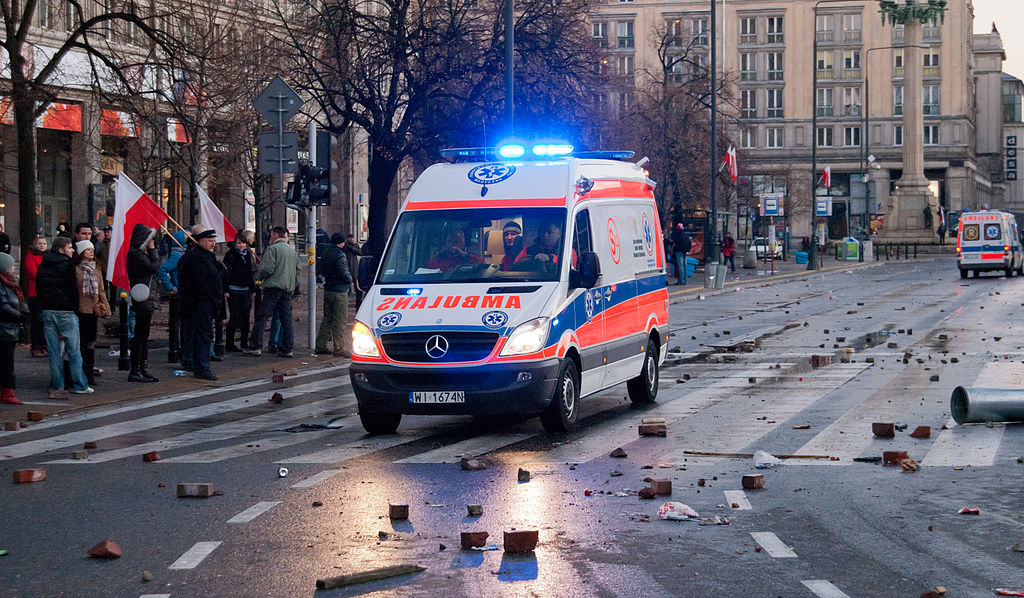In last month’s parliamentary elections in Poland, the victorious, right-wing Law and Justice Party made history as the first party to win a majority government in a free election. With the opposition abated, they are now setting their sights on rewriting the constitution and dramatically changing the Polish political system. But will they succeed?
This article was written for Visegrad Revue
The outcome of Poland’s parliamentary elections weren’t a surprise to anyone. A strong victory of the right-wing Law and Justice Party (PiS), led by former Prime Minister Jarosław Kaczyński, the twin brother of the late President Lech Kaczyński, over the center-right Civic Platform Party (PO), which led the government for the last 8 years, was almost certain, as long time demise of it’s popularity was clearly visible in the polls.
An unexpected result, though is that for the first time since 1989 there is no parliamentary representation of the left – a big success for former punk-rocker, Paweł Kukiz’ angry movement, which was driven by a single agenda – replacing Poland’s proportional representation electoral system with a British-style first-past-the-post one – and scored 8.81% of the vote, securing 42 seats.
Without any real opposition, the PiS could be left to their own agendas – one of those would be their desire to rewrite the constitution, in order to give the President more power while curtailing the rights of Polish citizens.
Official results1 show that 37.58% of votes were cast for PiS, who will get 2352 of the 460 seats in the new Sejm, allowing the party to create the first majority government seated in a free election (it will also have a majority – 61 out of the 100 seats – in the higher chamber, Senat3). In the opposition, the PO only gathered 24.09% of the vote, giving it 138 seats; and together with 28 MP’s from the new neoliberal movement, .Modern, which received 7.60% of the vote, will be the only opposition in parliament.
To go ahead with proposed changes to the constitution PiS will need 307 seats. As observed by journalist, Edward Lucas, Kukiz’ movement is the most likely coalition partner here, although the movement is almost certainly destined to fall apart.4 The Polish People’s Party (PSL), a peasants´ party, who received 5.13% of the vote, taking 16 seats, is also likely to team up with almost anyone who will promise to maintain the status quo in the rural parts of Poland. But even then, the PiS will be short of a constitutional majority.
The United Left, a conglomerate of Alliance of the Democratic Left (SLD), the Green Party and those left from Janusz Palikot’s movement, which scored over 10% in the previous election only to swiftly disintegrate, played va banque and went to the election as a coalition. It turned out to be a mistake, as they failed to meet the 8% threshold needed for coalition representation by only achieving 7.55% of the vote. They blame Together (3.65% of the vote), a newly-created socially democratic party, for refusing to join them. But many commentators point out that Together’s supporters expected generational change on the left, and so supporting the SLD was not an option for them.
Also coming just shy of the 5% threshold needed for single party representation by securing only 4.76% of the vote, is the ultra right-wing movement, The Coalition for the Renewal of the Republic – Liberty and Hope (KORWiN), which was built around the controversial, Janusz Korwin-Mikke.
Now the PiS can begin “fulfilling their promises.” They entered the election proposing to hand money out to almost everyone, while cutting taxes at the same time. Experts claim that their promises are highly unrealistic and predict that they won’t even attempt to deliver, and PiS is aware of this fact.5
This political shake-up could lead to the realization of one of three following scenarios: the party´s disintegration, stable governance or their much-desired total domination.
1. Internal conflicts and the party’s demise
Within PiS one can distinguish four factions: those faithful to Father Tadeusz Rydzyk, head of the Catholic media empire that promotes an ultra-nationalistic, anti-EU and often anti-Semitic point of view; the “old hands” from Kaczyński’s obsolete party, Centre Agreement (PC); the young members, who feel restrained by Kaczyński’s authoritative leadership; and representatives of the satellite, United Poland (SP), created by renegades from PiS and Poland Together (PR), and led by defectors from the center-right PO.
Previously PiS’s moderate renegades were able to find shelter in the PO, but most condemned themselves to oblivion – hence United Poland’s desperate attempts to seek Kaczyński’s forgiveness. He has to balance it wisely, as granting too much power to renegades might anger those who stayed loyal to Kaczyński. But now Kukiz and his radicals as well as KORWiN, offer at least a potential alternative on the right. PiS might try to move further right in an attempt to squeeze them against a wall, but if they go too far in that direction, some of the party’s less radical members might join the ranks of the opposition.
Seeking a coalition partner might be a formidable task. Apart from the unpredictable Kukiz only the peasant’s party might be desperate enough to risk their demise, like the League of Polish Families (LPR), and the Self-Defense of the Republic of Poland (SRP) did before it, getting “eaten,” due the the PiS’s reluctance to share power.
It is also unlikely that the opposition will gain enough support to create an anti-PiS coalition, especially because they would have fight President Andrzej Duda, closely affiliated to the PiS and Kaczyński, either leading to a minority PiS government or premature elections.
2. The creation of a stable majority government
Aware of the above, Kaczyński declared that changes could only be introduced under the conditions of a full PiS victory, and now they are ready.6 While Jarosław Kaczyński prioritizes defense and historical politics over the economy, PiS voters will still expect his government to fulfill electoral promises. Blaming the PO for their lack of cooperation, as President Duda did this summer,7 will not work any more.
Therefore, either the PiS needs to unleash a spending spree, or find some new scapegoats – maybe for example, international corporations. Both fiscal irresponsibility or failing to deliver might deter voters from reelecting PiS for the next term. Therefore, it is more likely that the party will try to draw public attention away from broken promises, by fighting corruption (either real or imaginary), or by getting involved in international politics or by distracting the public with ideological discussions.
3. PiS achieves a greater majority and pushes ahead with constitutional changes
In order to secure its power position, PiS will have to introduce major changes to the construction of the Polish state. While their 2010 constitution project was removed from their website (probably in attempt to avoid scaring voters) it can be found here.8 The proposed changes would curb parliamentary democracy and strengthen the position of the president by giving him greater government influence, the ability to dissolve the parliament or to remove judges from their posts. The proposed constitution will also deliver tools to override parliamentary opposition by granting the president the rights to issue decrees, bar the opposition from proposing bills to government amendments and facilitate referendums. And if that was not enough, it also restricts citizen’s rights and blocks the possibility of social reforms, by making it virtually impossible to introduce civil partnerships or homosexual marriages, delegalizing abortion and conversely strengthening the position of the Catholic Church, and by taking away Pole’s explicit right to strike.
To amend the constitution, PiS needs to gather another 70 votes, and even if it colludes with the peasant’s party and Kukiz, the party will still be about 20 short. Therefore it might try to persuade some of the PO members – the defectors from PiS, who might be lured back if they see that the United Poland renegades are back in Kaczyński’s graces. Some members on the right flanks of the PO might also decide to follow in Jarosław Gowin’s tracks.9 If the proposed changes to constitution go ahead, Poland will follow the lead of Orbán’s Hungary, or perhaps even Putin’s Russia.
Foreign policy – the big question
Because international politics didn’t even come up during discussions about the new government’s shape, and no concrete declarations were made during the PiS’s campaign, apart from some round talk like “Poland has to get off it’s knees,” foreign policy is the great unknown. PiS has always been hostile towards Russia, especially since 2010’s Smoleńsk crash,10 but that might change with EU relations likely deterioration. Especially now that warmer relations with Russia might help. Russia sponsors Polish nationalists and their propaganda is successful in setting Poles and Ukrainians against each other, pointing out at anti-Polish sentiments, while reminding Poles about Ukraine’s WW2 crimes committed against them. Nationalists, who entered the parliament from Kukiz lists,11 and have won over supporters of the pro-Putin, Janusz Korwin-Mikke,12 are leaning towards Russia, partially due to rise in the pro-Bandera13 nationalist movement in Ukraine and partially due to raising anti-EU sentiments as in right wing narrative EU is a threat to Polish sovereignity. This pro-Russian twist would be yet another similarity to Orbán’s Hungary.14
Kaczyński’s radical stand on the refugee crisis, some even comparing his words to anti-Semitic propaganda from 1930’s will also prevent good relations with the West.15 His opposition to granting refugee status to those in need and his refusal to show solidarity with the rest of the EU as they deal with the crisis will not go over well with Germany’s Angela Merkel and other Western leaders. However calls for curbing immigration and a refusal to submit to Brussel’s dictates might be a godsend to David Cameron, who is desperate to find support for his proposed EU reforms.16 And while central Europe’s position might be strengthened with all four leaders of the V4 now thinking similarly, their adversity might also create a split within EU.
Profound changes on the horizon for Poles
And what will the victory of the PiS mean for average Pole? It’s already clear that they plan to make radical U-turns in many important areas. Realizing Kaczyński’s proposed reforms to the country’s administrative division17 could be a good pretext for new local elections,18 which would weaken the peasant’s party even further.
The already announced education reforms could also be just a pretext to shape the education system along new PiS guidelines focusing on patriotic education.19 While analogical changes are expected on the media market as well.20
The Catholic Church’s political power will be radically strengthened, despite the majority of Poles’ (even many Catholics, themselves) belief that it has too much power already.21 The party’s endorsement of conscience clause laws will limit access to the medical procedures and pharmaceuticals the Church doesn’t accept.
While the citizen bill, which aimed to shift the cost of religious education from the state to the Church will almost certainly be rejected, although it was supported by over 100,000 signatories.22 And because PiS will require a smoke screen to distract the public from their overblown economic promises, ideological discussions will surely dominate public life again.
Democracy without checks and balances
The great success in the elections will allow PiS to sweep its own dirt under the carpet, so to speak. The biggest scandal of recent years involved prominent figures of the PiS, although recent political discussions seems to be dominated by the information leaked from an eavesdropping affair focusing on the former government and the PO.23
Investigative journalist, Bianka Mikołajewska, can be accredited with uncovering the transfer of huge amounts of money from the SKOK cooperative saving societies network to PiS Senator Grzegorz Bierecki’s private company,24 which was used to finance the party´s press empire.25 So it’s very unlikely that PiS will employ independent entities to fight corruption. More likely, the party will yet again focus on playing dirty political tricks on the opposition, as was the case with the previous PiS government (2005 – 2007).26
The opposition control is sure to be very weak, and the situation will be exceptionally hard for the PO. Since her party’s defeat, PM Ewa Kopacz has so far managed to keep the PiS in check, but calls for her resignation can now be heard. And there aren’t any other leaders in sight. As Edward Lucas pointed out, the PO might not be able to regain the trust of voters, who are fed up with its sleaze and incompetence, leading to the party’s dissolution. Some PO members may see .Modern as a life boat, but even with an influx of PO defectors, .Modern will still not be strong enough to assume the role of the major opposition party. The PO’s decay might also proved the chance for the non-parliamentary opposition, such as Together, to court PO voters, improving their results in the next elections.
It’s hard to say if the current parliament will last a full term or if PiS will manage to change the basic rules of Poland’s democracy. One thing is sure: these have been the most important elections since the fall of the Communism, and Poles should expect severe turbulence. The results also confirmed that Poland is experiencing a radical split – two halves of society living in completely separate universes with almost no middle ground. These elections could also be a prelude to generational changes in Polish politics. Despite the fact that over a quarter of a century has passed, the most important positions in (almost) every party are still occupied by people, who even if they did not participate in the roundtable negotiations, themselves, were already active on the political scene in 1989.
List of political parties and movements
-
.Modern (.Nowoczesna)
-
Alliance of Democratic Left (Sojusz Lewicy Demokratycznej, SLD)
-
Centre Agreement (Porozumienie Centrum, PC)
-
Civic Platform (Platforma Obywatelska, PO)
-
The Coalition for the Renewal of the Republic – Liberty and Hope (KORWiN: Koalicja Odnowy Rzeczypospolitej Wolność i Nadzieja)
-
Green Party (Partia Zieloni)
-
Law and Justice (Prawo i Sprawiedliwość, PiS)
-
The League of Polish Families (Liga Polskich Rodzin, LPR)
-
The Polish People’s Party (Polskie Stronnictwo Ludowe, PSL)
-
Poland Together (Polska Razem, PR)
-
Self-Defence of the Republic of Poland (Samoobrona Rzeczpospolitej Polskiej)
-
Together (Razem)
-
United Left (Zjednoczona Lewica)
-
United Poland (Solidarna Polska, SP)
1 Obwieszczenie państwowej komisji wyborczej z dnia 27 października 2015 r. o wynikach wyborów do Sejmu Rzeczypospolitej Polskiej przeprowadzonych w dniu 25 października 2015 r./The National Electoral Commission´s Notice from 27 October 2015. On the results of the elections to the Polish Sejm held on 25.10. 2015, accessed November 05, 2015, http://parlament2015.pkw.gov.pl/pliki/1445959303_obwieszczenie_sejm_wybory_wyniki.pdf.
2 Situation of newly elected Łukasz Zbonikowski is unclear. He is known mostly for his drunk driving adventures, including a well known case of crashing a golf cart into a hotel in Cyprus. Just before elections he was forced to quit PiS over allegations of domestic abuse, but refused to step down and was elected to parliament despite Jarosław Kaczyński calls for PiS supporters to refrain from voting for him. See – kło, rz, rzw -, Poseł Zbonikowski odchodzi z PiS, ale w wyborach wystartuje. Po tym, jak żona doniosła na niego na policję/A MP Zbonikowski leaves the PiS, but continues in the elections even after his wife reported him to the police, 17.9. 2015, accessed November 05, 2015, http://www.tvn24.pl/wiadomosci-z-kraju,3/lukasz-zbonikowski-oskarzony-przez-zone-o-kradziez-telefonu,577981.html.
3 Obwieszczenie państwowej komisji wyborczej z dnia 27 października 2015r. o wynikach wyborów do Senatu Rzeczypospolitej Polskiej przeprowadzonych w dniu 25 października 2015 r./ The National Electoral Commission´s Notice from 27 October 2015. On the results of the elections to the Polish Senate conducted on 25 October 2015, accessed November 05, 2015, http://parlament2015.pkw.gov.pl/pliki/1445959339_obwieszczenie_senat_wybory_wyniki.pdf.
4 Edward Lucas, Poland After Parliamentary Elections, 26.10. 2015, Center for European Policy Analysis (CEPA), accessed November 05, 2015, http://www.cepa.org/content/poland-after-parliamentary-elections.
5 Eksperci: PiS nie zagrozi gospodarce, bo nie spełni obietnic/ Experts: Law and Justice does not threaten the economy because they do not meet the promises, Wyborcza.biz, 26.10. 2015, accessed November 05, 2015, http://wyborcza.biz/biznes/1,100896,19092365,eksperci-pis-nie-zagrozi-gospodarce-bo-nie-spelni-obietnic.html.
6 Jarosław Kaczyński: Polska potrzebuje nowej władzy, jednopartyjnego rządu PiS/Jarosław Kaczyński: Poland needs a new government, an one-party government led by Law and Justice, 26.09. 2015, accessed November 05, 2015, http://www.polskieradio.pl/5/3/Artykul/1515098,Jaroslaw-Kaczynski-Polska-potrzebuje-nowej-wladzy-jednopartyjnego-rzadu-PiS.
7 Duda: niektórzy ochoczo manipulują moimi słowami mówiąc, że wycofuję się z obietnic/Duda: Some people willingly manipulate with my words, saying that I am withdrawing my promises, onet.wiadomości.pl, 8.8. 2015, accessed November 05, 2015, http://wiadomosci.onet.pl/kraj/duda-niektorzy-ochoczo-manipuluja-moimi-slowami-mowiac-ze-wycofuje-sie-z-obietnic/el88xt.
8 Konstytucja Rzeczypospolitej Polskiej. Projekt Prawa i Sprawiedliwości, (styczeń 2010)/The Constitution of the Polish Republic. A Project of the Law and Justice (January 2010), accessed November 05, 2015, https://drive.google.com/a/vosp.cz/file/d/0B2JtpyJv1BeRa29yd2hPMm9xaEU/view?pli=1.
9 Jarosław Gowin is a conservative politician and editor and served as Minister of Justice in the cabinet of Prime Minister Donald Tusk between 2011 to 2013, accessed November 05, 2015, https://en.wikipedia.org/wiki/Jaros%C5%82aw_Gowin.
10 „On 10 April 2010, a Tupolev Tu-154 aircraft of the Polish Air Force crashed near the city of Smolensk, Russia, killing all 96 people on board. Among the victims were the President of Poland Lech Kaczyński and his wife Maria, the chief of the Polish General Staff and other senior Polish military officers, the president of the National Bank of Poland, Polish Government officials, 18 members of the Polish Parliament. The group was arriving from Warsaw to attend an event marking the 70th anniversary of the massacre, which took place not far from Smolensk.“, accessed November 05, 2015, https://en.wikipedia.org/wiki/2010_Polish_Air_Force_Tu-154_crash.
11 Wojciech Czuchnowski, Jacek Harłukowicz, Wybory 2015 r. Kukiz wprowadził do Sejmu narodowców/The Elections of 2015. Kukiz introduced the nationalists to the Parliament, 27.10. 2015, accessed November 05, 2015, http://wyborcza.pl/1,75478,19093230,wybory-2015-r-kukiz-wprowadzil-do-sejmu-narodowcow.html?pelna=tak.
12 Korwin-Mikke o prezydencie Rosji: jego ekselencja Putin/Korwin-Mikke on the Russian president: His Excellency Putin, 27.4. 2015, accessed November 05, 2015,
13 Stepan Bandera (1909–1959) was a leader of the Ukrainian nationalist and independence movement and is a controversial historical figure honored and condemned at the same time. Accessed November 05, 2015, https://en.wikipedia.org/wiki/Stepan_Bandera.
14 Gabriela Baczynska, Russia’s relations with Hungary warm as ties with West chill, 19.11. 2014, Reuters, accessed November 05, 2015, http://www.reuters.com/article/2014/11/19/us-russia-hungary-idUSKCN0J326120141119.
15 Ian Traynor, Europe’s eastern side, 26.10. 2015, The Guardian, accessed November 05, 2015, http://www.theguardian.com/world/2015/oct/26/jarosaw-kaczynski-one-more-thorn-in-europe-eastern-side.
16 Ian Traynor, David Cameron’s EU demands letter explained, 10.11. 2015, The Guardian, accessed November 10, 2015, http://www.theguardian.com/politics/2015/nov/10/david-camerons-eu-demands-letter-explained.
17 Kaczyński w Koszalinie: utworzymy nowe województwo/ Kaczynski in Koszalin: we will establish a new province, 27.9. 2015, accessed November 05, 2015, http://wiadomosci.onet.pl/szczecin/kaczynski-w-koszalinie-utworzymy-nowe-wojewodztwo/xg1zlv.
18 Mariusz Jałoszewski, Bartłomiej Kuraś, PiS ogłosi nowe wybory samorządowe?/ Will the Law and Justice movement announce new local elections? 28.10. 2015, accessed November 05, 2015, http://wyborcza.pl/1,75478,19101082,pis-oglosi-nowe-wybory-samorzadowe.html.
19 Nowa instytucja wychowa dzieci, czyli pomysły PiS na edukację/The new institution will raise children, or on the ideas of the Law and Justice on education, 9.9. 2015, accessed November 05, 2015, http://polska.newsweek.pl/pis-program-dotyczacy-nauczycieli-i-szkolnictwa,artykuly,370153,1.html.
20 Grzegorz Krawczyk, PiS szykuje rewolucję w mediach publicznych?/Is the Law and Justice movement preparing a revolution in the public media? 27.10. 2015, , accessed November 05, 2015, http://wiadomosci.onet.pl/tylko-w-onecie/pis-szykuje-rewolucje-w-mediach-publicznych/sh87mv.
21 Tomasz Oryński, Je Polsko opravdu katolická země?/Is Poland a really Catholic country? 11.12. 2012, , accessed November 05, 2015, http://blisty.cz/art/66502.html.
22 Zebraliśmy 100 tys. podpisów/We managed to collect 100 thousand signatures, 29.9. 2015, accessed November 05, 2015, http://swieckaszkola.liberte.pl/zebralismy-100-tys-podpisow/.
23 Tomasz Oryński, On eavesdropping affair in Poland, 23.6. 2014, accessed November 05, 2015, https://orynski.eu/on-eavesdropping-affair-in-poland/.
24 Piotr Pytlakowski, Ścigana przez SKOK. Bianka Mikołajewska o tajemnicach funkcjonowania SKOK/Pursued by the unions. Bianka Mikołajewska of the mysteries of the credit unions´ operations, 24 marca 2015, accessed November 05, 2015, http://www.polityka.pl/tygodnikpolityka/kraj/1613283,1,bianka-mikolajewska-o-tajemnicach-funkcjonowania-skok.read.
25 Michał Krzymowski, SKOK. Prawicowe źródełko/Credit unions. A right-wing spring, 19.9. 2012, Newsweek Polska, accessed November 05, 2015, http://biznes.newsweek.pl/skok–prawicowe-zrodelko,96095,1,1.html.
26 Mariusz Kamiński, były szef CBA, skazany na więzienie. Bez zawieszenia/Mariusz Kaminski, the former head of the CBA, sentenced to prison. Without suspension, Polityka, 30.3. 2015, accessed November 05, 2015, http://www.polityka.pl/tygodnikpolityka/kraj/1614205,1,mariusz-kaminski-byly-szef-cba-skazany-na-wiezienie-bez-zawieszenia.read.






